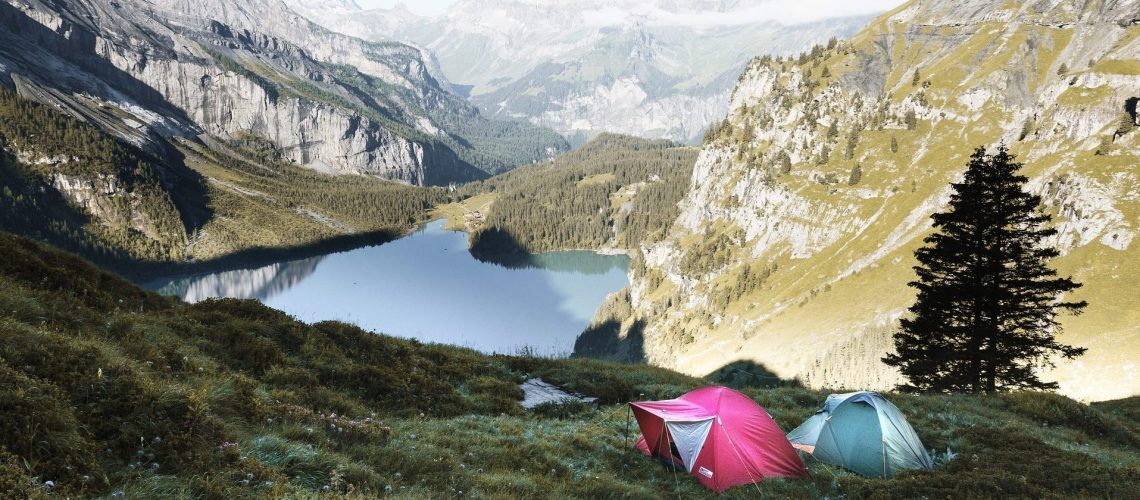What better way is there to connect with nature than to go camping? Close your eyes and imagine it: just you and the wide-open wilderness. Now, imagine yourself freezing and starving because that’s exactly what would happen if it were just you and the wilderness.
No matter what your skill level, you’ll need to bring at least some bare essentials along with you on the adventure. But walking the line between minimalist camping (taking as little as humanly possible to survive) and spending a fortune at Patagonia (the term “glamping” comes to mind) can be tough. If you’re not careful, it’s entirely possible for your simple camping trip to cost as much as a Vegas vacation.
There are lots of ways to break the bank, but here a few tips to ensure your next back-woods adventure doesn’t get you into big-city debt.
Be Careful Where You Shop
Whether it’s tents, sleeping bags, camp chairs, or anything else: avoid the big names. Sure, Patagonia and North Face make great, reliable products, but there are loads of stellar options available from off-name brands. Go on Amazon, read the reviews and listen to the opinions of people who were in your exact position a few weeks ago.
Buying cross-over equipment is also a good idea. Rather than spending money on specialized campfire cooking equipment, consider buying an inexpensive cast iron pan from Lodge, which could also be used at home if you ever decide to return to civilization. The same approach can be had with jackets, boots and other necessities.
No, You Don’t Need A French Press
The range of available products these days is outstanding. No matter what your niche interests are, there’s almost certainly a camp equivalent on the market. French presses, waterproof drones, battery-powered record players and solar bongs are all cool, but let’s get one thing straight: you’re not going camping to be as entertained as humanly possible. Be OK with getting out of your comfort zone for a few days. While you’re on Amazon, spend 5 bucks on a used book, kick back and sink into life’s simple pleasures.
Don’t Buy Free Things
Camping without a campfire is just sleeping outside, which pretty much sucks. In order to have that fire, though, you’ll need something to burn. But rather than buying a half-dozen bundles of timber at Whole Foods, it might for possible for you to pilfer the woods around your campsite for materials.
Not all campgrounds allow visitors to collect local wood, so you’ll want to look this up before you go. But if that kind of thing turns out to be OK, bring an axe and a saw along with you. There’s nothing quite so rewarding and primal as finding, chopping, stacking and burning your own wood. Also, if that used paperback you bought turns out to be crap, you can always use it for kindling.
Parks Pass
If you plan on hitting more than one National Park, you should opt for the America the Beautiful Pass. The cost is 80 dollars, two people can register on the same account, it’s good for an entire year and it’s valid at every National Park in the United States. When you consider that the fee for a single vehicle to enter a National Park is frequently 30 dollars, the math becomes simple.
You should note that this pass only covers the cost of entering the parks and not any extras like camping or fishing permits. Nevertheless, it’s pretty much a no-brainer for those who want to make camping a regular thing.
Camp For Longer
The longer you camp, the more it costs, right? Right… kind of. Although you might need to buy more food and supplies, the cost-per-day of most trips decreases as the duration of the trip increases. For example: if you spend 100 dollars on gas to go on a two-day camping trip, that’s 50 dollars per day. If you stretch your trip to four days, then the fuel cost per day goes down to 25 dollars per day. You catch my drift?
Park passes and camping fees sometimes work similarly. Oftentimes, parks will only sell week-long admission passes, meaning you can get more bang for your buck if you stick around a bit longer than expected. Anyone can sleep outside for a night or two, but longer trips are more gratifying. And every additional day you spend in the woods is a day you’re not direct depositing your paycheck to Amazon Prime.
There’s A Lot Of Open Space Out There
People naturally gravitate toward the United States’ National Parks, and for good reason, they’re some of the most beautiful in all the world. But this is one of the biggest countries in the world and there is such an overwhelming amount of vacant land here. Obviously, trespassing is a crime and I’m compelled to warn you away from it. That said, I have definitely had some of my best camping experiences while wandering onto vast stretches of land in the middle of nowhere.
Anyway, it’s not necessary to trespass in order to camp for free. Plenty of government land allows for it and there are many proper parks that don’t charge fees. You might have fewer amenities in these spots (think: public toilets, running water, pre-dug fire pits), but not necessarily. Get online and click around. You might be surprised to find what’s in your area.
Don’t Skimp Where It Counts
No matter where you put your stakes in the ground, safety should always remain a top priority. You should never cheap out on gear that your life might depend on. That cool carabineer at the dollar store is meant to be used as a keychain, not as a repelling device.
Making a list is helpful here. Determine what you’ll need to spend money on, which pieces of equipment are the most important, and purchase those first. If you have any money left over in the budget, then feel free to invest in that solar bong.
Happy Camping and Peace Out!

